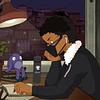Take a photo of a barcode or cover
9/10
Just reread this series for the first time in many years and it does not disappoint. It's truly the most stunning, imaginative, and enjoyable graphic novel I've ever read.
Just reread this series for the first time in many years and it does not disappoint. It's truly the most stunning, imaginative, and enjoyable graphic novel I've ever read.
I am so sad that this series is over, because it was just SO GOOD. I really hope that one day I can own all ten volumes, because I can definitely see myself wanting to re-read this series many times. Wonderful, incredible job, Mr. Gaiman.
The book was all right. I guess. I must have missed the bit in this series when Morpheus was likeable; when we were meant to get attached; when he was even a character, rather than a force of nature that was the nexus around which a whole lot of more interesting lives intertwined. Maybe it was the road trip with Delirium that was meant to do it. Who knows?
More significant than any of the above drivel is the fact that, somewhere between the first and final pages of this book, I learnt about what an absolute fucking monster Neil Gaiman is. Allegedly.
You know how, when you read stuff containing sexual abuse, you kind of assume by default that the author is presenting that abuse as something bad, because of course, it is? I think everyone made that assumption about Sandman and Gaiman. I know I sure did. That doesn't mean there's something wrong with me. There's just something wrong with him. Allegedly.
People bring up Calliope's story a lot, naturally, but I'm remembering a later scene in Faerie, in which Puck turns up, shoves his hand down a random lady's dress, gropes her roughly, and then leaves her there, ignoring her evident distress. This scene goes unchallenged and unremarked upon. It leads to nothing. It's just meaningless horridness.
I know Gaiman is claiming the usual, it was all consensual, if it crossed a line I didn't know it, etc etc. And of course, it's impossible to know a person's mind through their art. But I see a man with these allegations against him, and I see a man who illuminates his work with imagery of flagrant and wanton disregard for boundaries and consent. I draw a connecting line. I don't think that means there's something wrong with me.
I'll finish up reading Endless Nights and Overture, because I've already borrowed them from the library so I might as well. I won't talk much about them, though, if at all. I don't want to spend much more time thinking about a man whose works were formative for a teenage me, but who I evidently grew out of a long time ago, and who is such a disgusting specimen of the lowest of humanity. Allegedly.
More significant than any of the above drivel is the fact that, somewhere between the first and final pages of this book, I learnt about what an absolute fucking monster Neil Gaiman is. Allegedly.
You know how, when you read stuff containing sexual abuse, you kind of assume by default that the author is presenting that abuse as something bad, because of course, it is? I think everyone made that assumption about Sandman and Gaiman. I know I sure did. That doesn't mean there's something wrong with me. There's just something wrong with him. Allegedly.
People bring up Calliope's story a lot, naturally, but I'm remembering a later scene in Faerie, in which Puck turns up, shoves his hand down a random lady's dress, gropes her roughly, and then leaves her there, ignoring her evident distress. This scene goes unchallenged and unremarked upon. It leads to nothing. It's just meaningless horridness.
I know Gaiman is claiming the usual, it was all consensual, if it crossed a line I didn't know it, etc etc. And of course, it's impossible to know a person's mind through their art. But I see a man with these allegations against him, and I see a man who illuminates his work with imagery of flagrant and wanton disregard for boundaries and consent. I draw a connecting line. I don't think that means there's something wrong with me.
I'll finish up reading Endless Nights and Overture, because I've already borrowed them from the library so I might as well. I won't talk much about them, though, if at all. I don't want to spend much more time thinking about a man whose works were formative for a teenage me, but who I evidently grew out of a long time ago, and who is such a disgusting specimen of the lowest of humanity. Allegedly.
Ok so. This thing about how Dream has died. Somehow. Though he's not really a living thing, but all right. In the last book, where that happened, I was disappointed. Since I found out about it at the beginning, I was waiting for something big to cause it -- a severe sacrifice, or a severe miscalculation, something severe enough to justify such a big leap. But I'm disappointed in the reasoning. I don't think readers really understand the Orpheus thing, because while it looked like a big deal, no one said very much about it. So why did this really have to happen?
And, this is important, but controversial: I don't think Dream is strong enough of a character to pull us into a tragedy with him. I think that actually this is one of those series where the title character is one of the least compelling pieces. He is cool, but I think that he rarely appears to be anything. His most vibrant moments are mostly when his sister Death is talking with him, because she is awesome. 5 stars for Death. So much so that I wondered, was this idea just an excuse to get her in the picture to say some really good stuff to him? But that's not it.
And I don't buy him as reluctant sullen romantic anti-hero -- the whole thing with Nuala's being in love with him after being his servant for so long and inadvertently dooming him by calling him to her, just, no. Thessaly's story about their relationship is at least somewhat intriguing, though not really in line with the Dream King we've seen.
There's some nice endings in this book, but not a lot of answers, which is what I hoped for. I still don't really get why this happened to Dream, and why baby Daniel took his place. Among other things. I felt frustrated that the funeral was followed by a bunch of short stories, because I needed more of the real story. The art in this volume is the most wonderful in the whole series, though, a huge improvement over the solidly icky looking Book 9. And Matthew the raven's angst was really good.
I wonder what the heck is going to be in Book 11.
And, this is important, but controversial: I don't think Dream is strong enough of a character to pull us into a tragedy with him. I think that actually this is one of those series where the title character is one of the least compelling pieces. He is cool, but I think that he rarely appears to be anything. His most vibrant moments are mostly when his sister Death is talking with him, because she is awesome. 5 stars for Death. So much so that I wondered, was this idea just an excuse to get her in the picture to say some really good stuff to him? But that's not it.
And I don't buy him as reluctant sullen romantic anti-hero -- the whole thing with Nuala's being in love with him after being his servant for so long and inadvertently dooming him by calling him to her, just, no. Thessaly's story about their relationship is at least somewhat intriguing, though not really in line with the Dream King we've seen.
There's some nice endings in this book, but not a lot of answers, which is what I hoped for. I still don't really get why this happened to Dream, and why baby Daniel took his place. Among other things. I felt frustrated that the funeral was followed by a bunch of short stories, because I needed more of the real story. The art in this volume is the most wonderful in the whole series, though, a huge improvement over the solidly icky looking Book 9. And Matthew the raven's angst was really good.
I wonder what the heck is going to be in Book 11.
Emotional closure. This one feels more like a coda than a full volume, but it's still necessary.
The first 3 chapters are Dream's Wake. It's a good closure to Morpheus' saga, however, there are two chapters tacked on the end that don't deal with the wake. They deal with Hob and Shakespeare, two mortals (sorta) that mad deals with Morpheus, while the stories are good ones, they feel sorta anticlimactic. Taken in and of themselves, they are good stories, but the last few volumes of the saga just set the bar so high, there was bound to be a letdown.
That said, if you've come this far, you'll think this to be a good read. Like any good story, I was sorry to see it end. And perhaps that's why I didn't enjoy this volume as much as the others.
That said, if you've come this far, you'll think this to be a good read. Like any good story, I was sorry to see it end. And perhaps that's why I didn't enjoy this volume as much as the others.
Esto se debería comentar como dios manda. Pero no. Porque este tomo me ha dejado tan rota que me he quedado atascada con "puta locura Neil Gaiman maldito chiflado genio maravilloso te como la p" y hasta ahí he llegado.
The Sandman cast takes its final bow with the last book in the series. Several characters going all the way back to book one make small cameos all paying their respects to the Dream Lord himself. Following immediately after the events of the Kindly Ones Dream himself has died, and the Endless gather for the funeral. It's probably the most simplistic of all the books, but it really shows how much Gaiman grew as a writer and how much love he has for this series. Easily one of the most emotional ones and if you ever lost anyone close to you... It really hits home.






